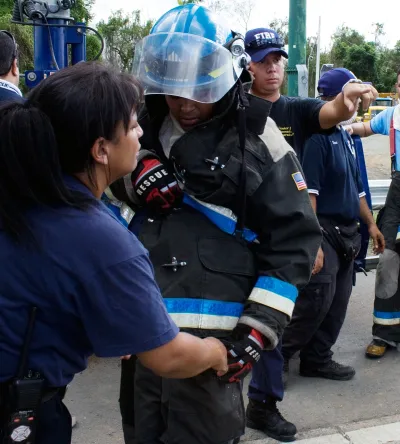Get a fast start in criminal justice with an associate degree
| Accreditation | Accredited by the Higher Learning Commission |
|---|---|
| Transfer credit | Transfer up to 45 approved credits |
| Admissions | Rolling admissions: start your degree when it’s right for you |
| Degree pathways | Pathways into a bachelor’s degree option, with future master's degree options in social work or business administration |
| QuickPaths | Transfer credit, stackable credentials, and adaptive learning technology build a faster pathway to a higher education with Herzing University |
Learn More Today!

Satisfaction rate
Our overall student satisfaction rate, according to the 2024 Herzing Graduate Survey.
Associate of Science in Criminal Justice - Online
The Associate of Science in Criminal Justice degree is a 60-credit undergraduate program which prepares you for a variety of entry-level careers in criminal justice. The degree program provides students with fundamental knowledge and skills in corrections, ethics, law and judicial processes, evidence forensics, juvenile justice, and much more.

Career-focused curriculum
Discover the crucial knowledge and skills required to succeed in your work and build a foundation for continued career growth.
Flexible schedule
You can take classes during the day or in the evening. We work hard to help you maintain school-life balance, striving to be as flexible as possible for busy non-traditional students.
Virtual services
Access to extensive virtual services, including academic advising, tutoring, support services, technical support and library services.
Lifelong support
We support your ongoing career advancement by providing comprehensive, personalized student services with lifelong career coaching.
Rolling admissions
No application deadlines to worry about. Apply when you’re ready and prepare to get started soon.
Criminal justice associate degree classes & curriculum details
This associate degree program is designed to give graduates the credentials and capabilities needed to gain entry-level positions at the local and state level. With a well-rounded approach to working within the public safety sector, graduates are employable in many different career areas.
All classes are delivered online.
Curriculum update for 2024
We’ve recently updated the associate degree curriculum to prioritize the modern interdisciplinary knowledge and skills needed for success in the criminal justice industry in the present and future.
New course options include diversity, equity, and inclusion, criminology, and crisis intervention.
| Program | Months i | Semester Credits |
|---|---|---|
| Associate of Science in Criminal Justice | 16 | 60 |
iAverage number of months for students to complete program
Program availability varies by location
Required Courses
All courses, 37.00 semester credit hours, are required.
Open Electives Courses
A minimum of 3.00 semester credit hours of open electives is required.
Required Courses in General Education
Students enrolled in this associates degree must complete a minimum of 18.00 semester credit hours in general education distributed among the following disciplines. Refer to the General Education section of the catalog for specific information about courses within each discipline. Courses transferred from other accredited colleges may also be used to meet these requirements.
*Required Course
Personal and Professional Development Courses
All courses, 2.00 semester credit hours, are required.
Tuition & Cost
Tuition & Cost
The cost of tuition for the Associate of Science in Criminal Justice program is $530 per credit.
You can potentially earn even greater savings by transferring credit from prior college coursework, applying for financial aid, or potential partnership opportunities through your employer.
Our goal is your career advancement. That's why we are always working to improve our curriculum and processes to make our program as affordable as possible while preparing you best for success in your work.
Scholarships & Financial Aid
You may be eligible for multiple scholarships and grants, both through Herzing University and several national scholarship websites.
Military/Veteran Discounts
Veterans, Active Duty U.S. Servicemembers, and spouses may qualify for a 10% tuition discount or tuition reduction to $250 per credit.
Criminal Justice program enrollment prerequisites



Prerequisites to enroll in the Herzing University Criminal Justice associate degree program include:
- Prior education requirement. Completion of high school diploma, GED, or equivalent.
- Entrance testing. Applicants must demonstrate the capacity to succeed in college-level courses via prior ACT/SAT scores, completion of prior college credit, or additional entrance testing.
- Availability of time, personal commitment, and a professional attitude. We exist to help enthusiastic students fully committed to reaching their highest career goals. Our faculty and leadership are dedicated to helping you reach them.
You will need to meet and interview with a Herzing University admissions advisor and complete an enrollment application to be admitted into the program.
If you have any additional questions regarding admissions into the program, please contact our admissions team.
Waived Enrollment Fee
Discover the educational pathway designed to maximize your career potential. Reach for greater heights with Herzing University.
What can I do with an associate degree in criminal justice
Earning an associate degree can help you better qualify for many different types of job opportunities in criminal justice, including:
- Detective / Criminal Profiler
- Private Security
- Police Officer
- Border Patrol Agent
- Correctional Officer or Bailiff
Education requirements will vary by employer, with some requiring only a high school diploma, some college coursework or a degree.
How can I advance my career?
Continuing your education with a bachelor’s degree in criminal justice can help you better qualify for jobs at federal agencies or advance to a higher level of responsibility in your current position.
Because career paths vary so widely, our criminal justice curriculum covers many different topics so you’re prepared well no matter what job you pursue. We exist to provide you an educational path towards the career you’ve always wanted.
Faq
Frequently Asked Questions
Didn't find the answer to your question? Send us an inquiry and we will be happy to answer all your questions!
With an associate degree in criminal justice, you may be eligible for a variety of jobs, including security guards and first-line supervisors of protective service workers. These jobs are found in a variety of industries, including travel, gambling, and investigation and security services.
According to the Bureau of Labor Statistics (BLS), security guards earned an average salary of $42,890 per year ($20.62 per hour).*
With a bachelor’s degree in criminal justice, you can be eligible for jobs such as first-line supervisor of correctional officer, first-line supervisor, police officer, or detective. The BLS reports the average wage for detectives and criminal investigators is $98,770 per year ($47.48 per hour).
You are typically not required to earn a degree to enroll in police academy and work as a police officer. A high school diploma is often the minimal required formal education, with a required background check. Some agencies may require a bachelor’s degree or a certain number of credit hours, especially at the federal level.
While you may not need a degree for your first entry-level job as a police officer, if you plan to continue advancing your career in criminal justice, earning an associate or bachelor’s degree is a good idea.
We strive for a balance of enriching and challenging—but not overwhelming. Our faculty, staff, and student support team is highly accessible and accommodating to help you succeed in your studies and graduate with a degree.
Our goal is to best prepare you for success in your work, and that’s what drives the development of our criminal justice curriculums.
Yes, absolutely. A degree in criminal justice can help prepare you for a variety of jobs, from law enforcement to public service. The field continues to expand, offering people more career opportunities.
In addition, a criminal justice degree provides a strong base of knowledge for future learning if you so choose. You can potentially pursue a law degree, a Master of Business Administration (MBA), or a Master of Social Work (MSW). With Herzing you may potentially earn dual credit towards an MBA or MSW as part of the bachelor’s degree program in criminal justice.
If you enjoy learning about the law, possess a strong sense of responsibility, and would like to help serve your community, a criminal justice degree may be a great fit. Learn more about our criminal justice degree program today!
Criminology is the study of crime, including its causes, consequences and costs. Criminology students study the behavior patterns, backgrounds, and sociological trends of criminals.
Criminal justice is a social science that seeks to identify and explain criminal behavior, as well as how society deals with crime. Criminal justice majors focus more on the legal and correctional systems, the deterrence of crimes, and ethics codes of behavior. Students in a criminal justice program often study a variety of topics including legal studies, psychology, public administration, and sociology.
Though they are different, both criminologists and criminal justice professionals work in the criminal justice sector to lessen crime and improve society.
There is no one-size-fits-all answer. Every job is different and educational requirements will vary by employer. Some will only require a high school diploma, while others (particularly federal agencies) may require an associate or bachelor’s degree.
You may be able to qualify for entry-level jobs without a degree, but advancing your career in criminal justice may become more difficult without any formal college-level education.
Course subjects and topics in our bachelor’s degree program include:
- Criminal Investigation, which provides an overview of the investigative process and current issues.
- Criminal Law, which covers key components of criminal law and its enforcement. It also includes an overview of the criminal law process, defenses, and jurisdiction of the courts.
- Ethics in Law Enforcement, which reviews public administration and ethical issues involved with public service.
- Evidence Forensics, which covers the law model and types and current rules of evidence acquisition.
- Crisis Intervention, which provides study in the methods and techniques employed by professionals in the field of crisis intervention.
- Risk Assessment, which helps students learn how to assess and identify threats, analyze targets, and implement approaches to risk assessment.
Yes, you can earn your associate or bachelor’s degree in criminal justice online. Look for a regionally accredited university like Herzing that has a well-rounded curriculum and experienced faculty and staff. Universities that offer student advisors and online support can help prepare you for academic success.
Once you have your associate or bachelor’s degree, you can also pursue additional training or education to help increase your earning potential and further your career.
Program Finder
Associate of Science in Criminal Justice
OnlineTo learn more about this program, click the Request Info button.
The Student Experience at Herzing
After graduating with my associate’s degree in medical office administration, I received several job offers. However, I decided to pursue a different passion and continue my education at Herzing with an associate’s degree in Criminal Justice. Today, I’m the owner of Daden Investigative Services in St. Louis, where I work as a licensed private investigator. Thank you, Herzing, for helping me jumpstart my career!
Paris Morris
Healthcare, Public Safety | Online CampusTaking year-round classes helped me complete my studies in a reasonable amount of time. Now, I'm currently in the running for a promotion at my department.
William B. Bonaguidi
Public Safety | Online CampusHerzing means everything to me. The instructors and staff have become my family and they were the reason I was able to complete my degree
Taeya Mills
Public SafetyThe online program is hard, but I learned that if you want something, you will do whatever it takes to accomplish your goal. My community health course helped me prepare to rebuild parts of my community and now I’m seriously considering pursuing my master’s degree in criminal justice.
Holli Yvette Thomas
Public Safety | Online CampusAfter graduating with my associate’s degree in medical office administration, I received several job offers. However, I decided to pursue a different passion and continue my education at Herzing with an associate’s degree in Criminal Justice. Today, I’m the owner of Daden Investigative Services in St. Louis, where I work as a licensed private investigator. Thank you, Herzing, for helping me jumpstart my career!
Paris Morris
Healthcare, Public Safety | Online CampusAccreditation & Disclosures
Herzing University is accredited by the Higher Learning Commission (hlcommission.org), an institutional accreditation agency recognized by the U.S. Department of Education.
View Herzing University Accreditation and Approvals
* BLS pay estimates calculate the median annual wage for various occupations. Per the BLS the median wage for an occupation is: "The wage at which half of the workers in the occupation earned more than that amount, and half earned less. Median wage data are from the BLS Occupational Employment and Wage Statistics survey." Bureau of Labor Statistics (BLS), U.S. Department of Labor, Occupational Outlook Handbook 2024. BLS median wage estimates do not represent entry-level wages and/or salaries. Multiple factors, including prior experience, age, geographic market in which you want to work, and degree level and field, will affect career outcomes, including starting salary and earnings as an experienced employee. Herzing neither represents that its graduates will earn the median salaries calculated by BLS for a particular job nor guarantees that graduation from its program will result in a job, promotion, particular wage or salary, or other career growth.
Recent Blog Posts
Waived Enrollment Fee
Discover the educational pathway designed to maximize your career potential. Reach for greater heights with Herzing University.






